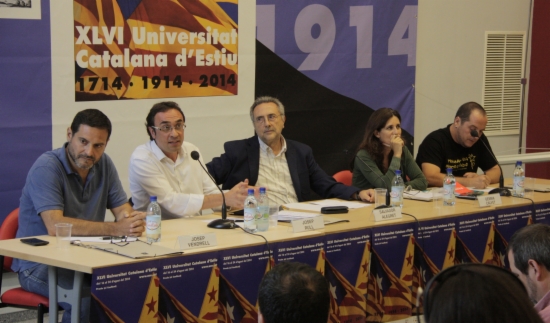21.08.2014 - 22:30
After the controversy of the last few weeks about whether the independence consultation initially scheduled on the 9th of November might be postponed if the Spanish authorities were to ban it, the 4 Catalan Parliament groups supporting this vote appeared together on Wednesday and reinstated their commitment to such a consultation. They reaffirmed their unity of action and their will to vote even if the Constitutional Court was to ban the call, which will be based on the Law on Consultation Votes to be approved by the Catalan Parliament in September. Leading figures from the governing centre-right pro-Catalan State coalition CiU, the left-wing independence party ERC, the green socialist and post-communist coalition ICV-EUiA and the radical left and independence party CUP emphasised that the “people had democratically elected to decide on their collective future through the polling stations”. They were referring to the results of the last Catalan Parliament elections, which were like a plebiscite on the right to self-determination and the organisation of an independence vote. Back then, with the highest turnout in years, 80% of the elected MPs promised to support a legal self-determination vote.
In the last year and a half, since Catalan elections were held in November 2012, the Spanish Government has totally rejected to even talk about how such a vote could take place and has made a restrictive interpretation of the Constitution, saying such a vote was “illegal”. After waiting months for an agreement with Madrid, in December 2013 a two-third majority of the Catalan Parliament approved the organisation of a self-determination vote on the 9th of November, 2014. This left the Spanish Government, chaired by Mariano Rajoy, enough time to react and negotiate or propose an alternative. Rajoy has not done any of the two options. In addition, in the last few months, Catalan representatives have repeated that they are willing to review the exact day and question of such a vote if the Spanish authorities wanted to sit and talk about it.
The Spanish authorities have closed the negotiation door on numerous occasions and they have even refused to work on finding a better accommodation of Catalonia within Spain through a reform of Spain’s territorial model. The People’s Party (PP) and Rajoy himself have rejected several times the mild reform of the Constitution proposed by the Spanish Socialist Party (PSOE), which does not even recognise Catalonia as a nation. The last time the PP strongly rejected a Constitutional Reform was this summer, when firstly its Secretary General María Dolores de Cospedal and later, Mariano Rajoy, closed the door to even discuss about it. In front of all this, Catalan representatives have insisted they will not accept Madrid’s blocking, neither the PP’s unilateral and uncompromising attitudetowards an issue that has been on the table for years and on which the Catalan people have given their explicit support through the 2012 democratic elections.
In the last few weeks, as November approaches, and coinciding with August summer holidays, there have been several voices within the CiU – which runs the Catalan Government – who have proposed the possibility to postpone November’s vote, if the Spanish authorities were totally against it. The most notorious one was the Catalan Vice President, Joana Ortega. After Ortega’s words, the ERC, the ICV-EUiA and CUP representatives complained loudly and insisted that November’s vote had to take place, even if the Constitutional Court was to ban it. They argued that the right to self-determination was not “owned” by Spanish authorities and they also stressed that the Constitutional Court was formed by people directly appointed by Spain’s two main parties: the People’s Party (PP), which runs the Spanish Government, and Spanish Socialist Party (PSOE). The day after the quarrel, the President of the Catalan Executive, Artur Mas, sent a unity message and insisted that if the Constitutional Court bans the self-determination vote, the Catalan reaction will be agreed among the parties supporting such a vote. He also insisted once again that “the only plan is to vote”.
Catalans will “exercise the will of an entire people in the ballot boxes”
On Wednesday, in a round table discussion organised in the Catalan Pyrenees, representatives from the CiU (Josep Rull), ERC (Gemma Calvet), ICV-EUiA (Josep Vendrell) and CUP (David Fernández) stated that their parties are fully committed to November’s self-determination vote. On that day Catalans will “exercise the will of an entire people in the ballot boxes”. In front of a hypothetical veto from the Constitutional Court, they engaged in finding alternative formulas to put the ballot boxes on the street, because “legality” and “democracy” are on their side, despite what the Spanish authorities say, they stated. The legality is based on the Catalan legal framework, developed during decades of self-government and by a democratically-elected parliament. Furthermore, there is a democratic mandate from the last Catalan elections, pushing parties to organise a self-determination vote.
Besides, since “the road [toward the 9th of November] will not be easy”, they asked citizens to participate in the massive demonstration scheduled on Catalonia’s National Day (the 11th of September), in order to pave the road towards the independence referendum. In 2012 and 2013, massive pro-independence demonstrations had already been organised on that day, respectively gathering 1.5 million and 1.6 million people, according to the Catalan Police.



